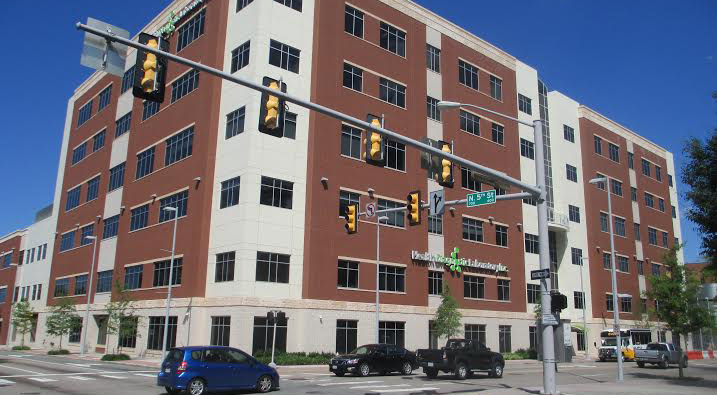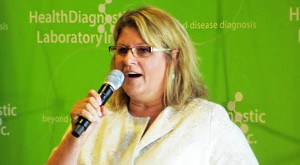
A group of HDL creditors hopes to look into the companies alleged payments to shareholders and other parties. Photo by Burl Rolett.
While Health Diagnostic Laboratory may have a new owner, its Chapter 11 bankruptcy case lives on and could bring further scrutiny to some of its insiders.
A committee of HDL’s unsecured creditors last week filed a motion in federal court for permission to investigate whether portions of huge transfers of money allegedly made to the company’s executives and shareholders can be recaptured into HDL’s bankruptcy estate to reimburse its creditors.
The transfers, which court records cite back to reports from the Wall Street Journal and Forbes, allegedly include $119 million going to HDL’s 16 shareholders between 2011 and 2013. Of that total, $50 million allegedly went to HDL’s three co-founders: Tonya Mallory, Joseph McConnell and Russell Warnick.
The investigation would also look into the $220 million in sales commissions that HDL reportedly paid to its former sales contractor BlueWave Healthcare Consultants between 2010 and 2014. A reported $173 million of that total allegedly went to BlueWave founders Robert Bradford Johnson and Floyd Calhoun Dent.
Mallory, McConnell, Warnick, Johnson and Dent are all HDL shareholders, according to court records. So is Tipton Golias, one of the blood testing company’s first investors, as are members of the Golias family. Tipton Golias is the founder and owner of Texas-based Helena Laboratories.
The motion ties its claims back to charges made by the U.S. Department of Justice, alleging that Mallory, Johnson and Dent masterminded a kickback scheme that caused the federal healthcare system to pay the company millions in unnecessary claims and HDL’s revenue to skyrocket.
The DOJ claim points out several instances when large sums of money went individually to Mallory, Johnson and Dent, supposedly in the form of salaries and bonuses.
“In sum, the activities engaged in by the Debtors generated enormous profits for several years,” last week’s motion states. “Those profits appear to have been funneled back to insiders and third parties in the form of salary, dividends, bonus, distributions, commissions, contributions, expense reimbursements and potentially other payments which may be recoverable for the debtors’ estates under several legal theories.”
The motion for the investigation was filed Sept. 30, the day after HDL’s sale to Texas-based True Health Diagnostics closed. True Health said it will discontinue the HDL brand, but HDL’s Chapter 11 bankruptcy case will continue to progress.
Richard Kanowitz, an attorney with the Cooley law firm representing the unsecured creditors committee, said the motion was filed “in cooperation with the debtors at the appropriate time so that they could sell the business and move onto the next stage of the case without the disruption that the investigation might otherwise cause.”
The creditors’ investigation is also known as a 2004 examination and is aimed at “revealing the nature and extent of the estate and to discover assets of the debtor which may have been intentionally or unintentionally concealed,” according to the motion.
“The purpose of the investigation is to determine if any cause of action exists,” Kanowitz said.
Ultimately, the 2004 examination will encompass parties including HDL, its shareholders and employees, and several individuals affiliated with HDL, along with Helena Laboratories, Dent, Johnson, BlueWave, and several entities related to BlueWave. The investigation could take shape through depositions and document research.
According to Kanowitz, the investigation will begin as soon as approval is secured during a hearing on Oct. 22.
He said it is unclear how much money HDL and its creditors may be owed due to the transactions.
“Discovery of the information requested is necessary for the committee to investigate and identify potentially valuable causes of action to be pursued on behalf of the Debtor’s estates and creditors,” the motion states.
Mallory’s legal representation declined to comment on the motion. McConnell, Warnick, Johnson, Dent and Tipton Golias did not return requests for comment.
Joe Golias, president of Helena Laboratories, declined to comment specifically on the litigation when reached last week but said “the Goliases were passive investors and have no say in the management or direction of HDL.”
Kanowitz said in several months, a liquidating Chapter 11 plan will likely be filed in HDL’s bankruptcy case. He said it is unlikely the case will be transitioned into Chapter 7.
Last week, True Health offered employment to hundreds of HDL employees but has not commented on an exact headcount. It’s also unclear whether McConnell and Warnick are now employed at True Health and in what capacity.

A group of HDL creditors hopes to look into the companies alleged payments to shareholders and other parties. Photo by Burl Rolett.
While Health Diagnostic Laboratory may have a new owner, its Chapter 11 bankruptcy case lives on and could bring further scrutiny to some of its insiders.
A committee of HDL’s unsecured creditors last week filed a motion in federal court for permission to investigate whether portions of huge transfers of money allegedly made to the company’s executives and shareholders can be recaptured into HDL’s bankruptcy estate to reimburse its creditors.
The transfers, which court records cite back to reports from the Wall Street Journal and Forbes, allegedly include $119 million going to HDL’s 16 shareholders between 2011 and 2013. Of that total, $50 million allegedly went to HDL’s three co-founders: Tonya Mallory, Joseph McConnell and Russell Warnick.
The investigation would also look into the $220 million in sales commissions that HDL reportedly paid to its former sales contractor BlueWave Healthcare Consultants between 2010 and 2014. A reported $173 million of that total allegedly went to BlueWave founders Robert Bradford Johnson and Floyd Calhoun Dent.
Mallory, McConnell, Warnick, Johnson and Dent are all HDL shareholders, according to court records. So is Tipton Golias, one of the blood testing company’s first investors, as are members of the Golias family. Tipton Golias is the founder and owner of Texas-based Helena Laboratories.
The motion ties its claims back to charges made by the U.S. Department of Justice, alleging that Mallory, Johnson and Dent masterminded a kickback scheme that caused the federal healthcare system to pay the company millions in unnecessary claims and HDL’s revenue to skyrocket.
The DOJ claim points out several instances when large sums of money went individually to Mallory, Johnson and Dent, supposedly in the form of salaries and bonuses.
“In sum, the activities engaged in by the Debtors generated enormous profits for several years,” last week’s motion states. “Those profits appear to have been funneled back to insiders and third parties in the form of salary, dividends, bonus, distributions, commissions, contributions, expense reimbursements and potentially other payments which may be recoverable for the debtors’ estates under several legal theories.”
The motion for the investigation was filed Sept. 30, the day after HDL’s sale to Texas-based True Health Diagnostics closed. True Health said it will discontinue the HDL brand, but HDL’s Chapter 11 bankruptcy case will continue to progress.
Richard Kanowitz, an attorney with the Cooley law firm representing the unsecured creditors committee, said the motion was filed “in cooperation with the debtors at the appropriate time so that they could sell the business and move onto the next stage of the case without the disruption that the investigation might otherwise cause.”
The creditors’ investigation is also known as a 2004 examination and is aimed at “revealing the nature and extent of the estate and to discover assets of the debtor which may have been intentionally or unintentionally concealed,” according to the motion.
“The purpose of the investigation is to determine if any cause of action exists,” Kanowitz said.
Ultimately, the 2004 examination will encompass parties including HDL, its shareholders and employees, and several individuals affiliated with HDL, along with Helena Laboratories, Dent, Johnson, BlueWave, and several entities related to BlueWave. The investigation could take shape through depositions and document research.
According to Kanowitz, the investigation will begin as soon as approval is secured during a hearing on Oct. 22.
He said it is unclear how much money HDL and its creditors may be owed due to the transactions.
“Discovery of the information requested is necessary for the committee to investigate and identify potentially valuable causes of action to be pursued on behalf of the Debtor’s estates and creditors,” the motion states.
Mallory’s legal representation declined to comment on the motion. McConnell, Warnick, Johnson, Dent and Tipton Golias did not return requests for comment.
Joe Golias, president of Helena Laboratories, declined to comment specifically on the litigation when reached last week but said “the Goliases were passive investors and have no say in the management or direction of HDL.”
Kanowitz said in several months, a liquidating Chapter 11 plan will likely be filed in HDL’s bankruptcy case. He said it is unlikely the case will be transitioned into Chapter 7.
Last week, True Health offered employment to hundreds of HDL employees but has not commented on an exact headcount. It’s also unclear whether McConnell and Warnick are now employed at True Health and in what capacity.




